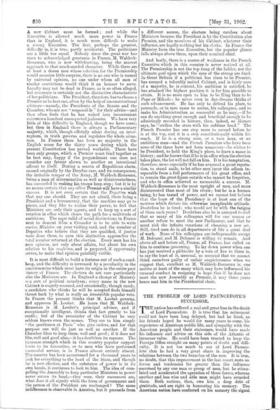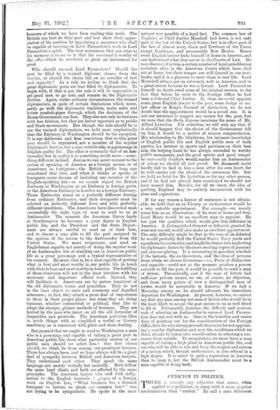THE PROBLEM OF LORD PAUNCEFOTE'S SUCCESSOR. T HE nation has suffered
a real and great loss in the death of Lord Pauncefote. It is true that his retirement could not have been long delayed, but had he lived, as his friends hoped he would for many years to come, his experience of American public life, and sympathy with the American people and their statesmen, would have made his influence and advice on this side of the Atlantic of immense value. He could have been trusted to keep the Foreign Office straight on many points of doubt and diffi- culty. It is not too much to say of Lord Paunce- fete that he had a very great share in improving the relations between the two branches of the race. It is true, no doubt, that this improvement in the last resort rests on forces and tendencies far greater than the influence exercised by any one man or group of men, but he stimu- lated and accelerated the operation of those forces, whereas another and less wise and able man might have retarded them. Both nations, then, owe him a deep debt of gratitude, and are right in honouring his memory. The. American nation have conferred on his memory the signal, honours of which we have been reading this week. The British can best do their part and best show their appre- ciation of his services by appointing a successor who shall be capable of carrying on Lord Pauncefote's work in Lord Pauncefote's spirit. The best monument they can raise to his memory is to see to it that his successor is worthy of the office which ho rendered so great an instrument for good.
Who should succeed Lord Pauncefote? Should the post be filled by a trained diplomat chosen from the Service, or should the choice fall on an outsider of tact and capacity ? As a rule we incline to think that the great diplomatic posts are best filled by diplomatists. To begin with, if that is not the rule it will be impossible to get good men to go into, and remain in, the Diplomatic Service. Again, under ordinary circumstances the trained diplomatists, in spite of certain limitations which neces- sarily go with the diplomatic tradition, make safer and batter conduit-pipes through which the decisions of the Home Government can flow. They also not only do business with less friction, but they are better reporters as to public and State movements. But though the rule should be to use the trained diplomatists, we hold most emphatically that the Embassy at Washington should be the exception. It is our deliberate and firm conviction that to this great post should be appointed, not a member of the regular Diplomatic Service, but a man outside who is a personage in English public life. The office is nominally that of an Am- bassador, but in reality it is something much more,—some- thing different in kind. Just as we can never consent to the notion of speaking of America as a foreign nation, or of Americans as foreigners—the British public long ago abandoned that idea, and when it thinks or speaks of foreigners never dreams of including any member of the English-speaking kin—so we cannot regard the British Embassy at Washington as an Embassy in foreign parts, or the American Embassy in London as a foreign Embassy. Those Embassies stand on a perfectly different footing from ordinary Embassies, and their occupants must be selected on perfectly different lines and with perfectly different intentions. The Americans have discovered most successfully the right typo of man to send to us as Ambassador. The moment the American Envoy lands at Southampton he becomes a great figure in English public life, and the President and the State Depart- ment are always careful to send us of their best, and to choose a man able to fill the part assigned by the opinion of the nation to the Ambassador from the United States. We must reciprocate, and send an Englishman capable not merely of doing the regular work of an Ambassador, but of standing out in American public life as a great personage and a typical representative of his country. He must, that is, be a man capable of putting what is best and most worthy in our public life in touch with what is best and most worthy in America. The fulfilling of those functions will not in the least interfere with his necessary and important official work. Instead, they will facilitate it. Americans are by nature impatient of the old diplomatic forms and punctilios. They do not in the least object to state and ceremony and dignified utterance ; in fact, they attach a great deal of importance to them in their proper place; but when they are doing business, whether commercial or political, they like to adopt the sharper, plainer methods of business. They are fretted by the men who insist on all the old formulae of despatches and protocols. The American politician likes to settle things with as simplified a verbal or literary machinery as is consistent with plain and clean dealing.
But granted that we ought to send to Washington a man who is a personage and capable of taking a great part in American public life, from what particular section of our public men should we select him ? Our first choice should, we think, be from among our prominent lawyers. There has always been, and we hope always will be, a great deal of sympathy between British and American lawyers. They understand each other. They speak the same language not merely verbally but mentally. Both follow the same legal ideals, and both are affected by the same principles. The American lawyer who said with indig- nation to the English barrister (1 propos of a foreign work on English law, " What business has a damned foreigner to lecture us about our common law ? " was not trying to be sympathetic. He spoke in the most natural way possible of a legal fact. The common law of England, as Chief Justice Marshall laid down, is not only part of the law of the United States, but is in effect part of the law of almost every State and Territory of the Union except Louisiana, and presumably New Mexico. Hence every English lawyer finds himself at home in America, and can understand what they are at in the Courts of Law. He may discover, it is true, a certain number of legal antediluvian monsters alive in the American Courts which have died out at home, but their images are still. figured in our text- books, and it is a pleasure to meet them in real life. Lord Herschel] always got on extremely well in America, and to a great extent because he was a lawyer. Lord Pauncefote himself no doubt owed some of his original success to the fact that before he went to the Foreign Office he had been a Colonial Chief Justice. If, then, we could appoint some great English lawyer to the post, some Judge or ex- law officer or King's Counsel of distinction, we do not doubt that the appointment would be a sound one. It is not our intention to suggest any names for the post, but we note that the Daily Express mentions the name of Mr. Alfred Lyttelton. For ourselves, we will only say that if it should happen that the choice of the Government fell on him, it would be a matter of sincere congratulation. His relationship to Mr. Gladstone, his intimate knowledge of English public life and English public men of both parties, his interest in sports and pastimes on their best side, the helping hand he has always extended to worthy public movements, and the good spirits and good temper he universally displays, would_render him an Ambassador of whom we should all feel proud: Mr. Roosevelt could hardly fail to find in him a man after his own heart, for he well carries out the ideals of the strenuous life. But we hold no brief for Mr. Lyttelton or for any other person, and if he had not already been mentioned we should not have named him. Besides, for all we know, the idea of quitting England may be entirely inconsistent with his aims and aspirations.
If for any reason a lawyer of eminence is not obtain- able, we hold that an ex-Viceroy or ex-Governor would be a very suitable appointment. For example—we merely name him as an illustration—if he were at home and free, Lord Minto would be an excellent man to appoint. He has just the qualities which would give him influence in America. A distinguished General or Admiral, granted he were not too old, would also make an excellent appointment. The only difficulty might be that in the case of an Admiral he would probably find the United States Navy yards and squadrons too attractive, and might be drawn into neglecting his diplomatic duties by the more exciting topics of gunnery and armour-plating. It is interesting to speculate whether if the lawyers, the ex-Governors, and the class of persons from whom we choose Governors—i.e., Peers of distinction and capacity—could not at the moment produce a person suitable to fill the post, it would be possible to send a man of letters. Theoretically, and if the man of letters had sufficient private means, we see, of course, no objection, and from many points of view a distinguished man of letters would be acceptable in America. If we had a Macaulay among us, we should advocate his immediate departure for Washington. At present, however, we cannot say that any man among our men of letters who would be in the least likely to accept the post occurs to us as well fitted to fill it. Fortunately, however, the difficult and anxious task of selecting an Ambassador to succeed Lord Paunce- fote does not rest with us. Ours is the humbler and easier duty of pointing out for the consideration of the Foreign Office, first the very strong grounds that exist for not appoint.. ing a regular diplomatist, and next the conditions which we think should be taken into consideration in selecting a suc- cessor from outside. To recapitulate, we must have a man capable of taking a high place in American public life, and one who will be able to win and keep the respect and esteem of a nation which, though enthusiastic, is also critical in a high degree. It is easier to gain a reputation in America than to keep it, but the British Ambassador must be a man capable of doing both.











































 Previous page
Previous page